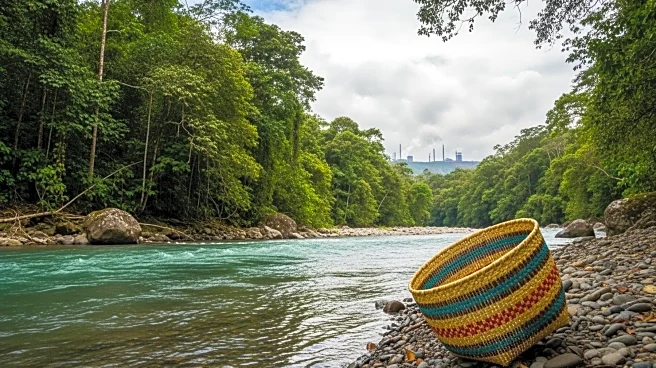What's Happening?
The Indigenous Kichwa community in Pakayaku, Ecuador, is actively defending their rainforest territory against increasing global mineral demand and government policies that threaten their land. The community,
led by the Hurihuri guardian corps, a group of 45 armed women, protects 71,000 hectares of rainforest. Illegal mining and organized crime have surged in Ecuador's Amazon, posing significant threats to Pakayaku's territory. The government plans to expand highways and mining operations, further endangering the community's autonomy and traditional land protections. President Daniel Noboa's administration is reopening Ecuador's mining registry to attract foreign investment, which could lead to increased pressure on Indigenous lands.
Why It's Important?
The situation in Pakayaku highlights the broader challenges faced by Indigenous communities in South America as global demand for minerals like copper, lithium, and nickel rises. These minerals are crucial for the energy transition and digitalization, making regions like Ecuador's Amazon pivotal in diversifying global supply chains. The pressure from economic interests and administrative challenges risks eroding the autonomy and traditional protections of Indigenous lands. The community's struggle underscores the need for sustainable development practices that respect Indigenous rights and environmental conservation.
What's Next?
Pakayaku's leaders are seeking allies to support their cause, emphasizing the global significance of their protected lands. As Ecuador's government continues to push for economic growth through mining and infrastructure development, the community faces ongoing threats to their autonomy. The international focus on mineral-rich regions like Ecuador's Amazon is likely to intensify, potentially leading to increased advocacy and support for Indigenous rights and environmental protection. The community's efforts to maintain visibility and seek external support will be crucial in their fight against encroaching economic interests.
Beyond the Headlines
The struggle of Pakayaku reflects broader ethical and cultural dimensions, as Indigenous communities worldwide face similar pressures from economic expansion. The community's consensus-based governance and sustainable development plans offer a model for balancing economic growth with environmental and cultural preservation. The global materials industry must consider the long-term impacts of resource extraction on Indigenous lands and prioritize sustainable practices that align with the rights and traditions of local communities.










